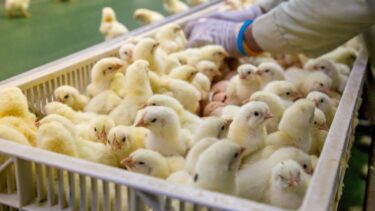Management is the uniting factor for productive chicks
Imagine departing a cozy, if not slightly cramped, egg and immediately being faced with the handling process most chicks face on their first day. Following hatching, an intensive handling procedure—requiring constant movement—induces a lot of stress to young birds. After handling is shipping and, finally, arrival at the farm where a supportive environment needs to be created to encourage success in the early stages of life.
Though little can be done about how a chick is handled before arrival, managing young animals effectively on the farm is essential to obtaining long-term zootechnical and economic performance. This is why the right management—ideal housing, good stockmanship, and providing access to the necessary nutrients—is crucial for chicks to cope in their first days.
Preparing the kindergarten
Due to the heavy handling and movements chicks experience, it is vital to prepare the barn adequately. By providing them with a calm environment that fits their needs, the incoming birds are able to finally settle down. The main parameters of a welcoming home for chicks are air and ground temperature, humidity, air quality, as well as feed and water access. Equally significant, though often overlooked, are parameters like the type of bedding material, the number and height of feeders/drinkers, the distance to feed and water lines, the lighting density, and the overall hygiene in the barn. Though it sounds like a lot, the good thing is that all of these are controllable with good management.

Especially in the beginning, stockmanship is an investment in the birds’ future health and performance. This includes early and regular observations of the overall behavior, i.e. spreading in the barn and activity provides a good impression of the constitution of your new flock. Further checks—crop filling, absorption of the yolk sac, quality of the navels, regular weighing, or the vent temperature—help to draw a complete picture of the quality of your flock.
Depending on the impressions combined with the data you collect (like feed and water intake, mortality, etc.) it will enable you to take the right measurements to steer your flock in the right direction.
All five senses are necessary for stockmanship

Right from the start
Unique from other species, birds have the advantage of nutritional storage in their body at birth—the remains of the yolk sac. Unlike other species in professional animal husbandry, the birds (no matter if it is chickens or turkeys) usually have no access to feed directly after hatching. Going through the process of hatching, grading, sorting, storage, and transport means it can take 24–72 hours until day-old chicks are placed at the farms and given access to feed. These circumstances make it obvious why early feeding in the poultry house is extremely important for later development.
Besides the external stressors the young birds have to face after hatching, there is also a harsh change in nutrition. While the yolk consists primarily of fats and proteins in poultry-specific molecules, the bird is now confronted with mostly plant-based fats, proteins, and, of course, a lot of starch.
Equally important, but often overlooked, is the demand for fresh, quality drinking water. During its life, chicks consume nearly twice the amount of water compared to feed; even more during times of heat stress. Therefore, water has a heavy influence on health and performance. Ensure the drinking lines are clean, the flow rate is appropriate, and the lines are set to the proper height for optimal growth.
Conclusion
As we have learned, there are a lot of factors that influence the performance of a poultry flock. Fortunately, there are several factors you can directly influence that will help enable the birds to perform. Proper stockmanship, especially in the starting phase, with good preparation and nutrition are the basics for a successful and profitable poultry operation.
This contact was suggested based on the location you are browsing from. You can of course also consult our other contacts and locations here.

